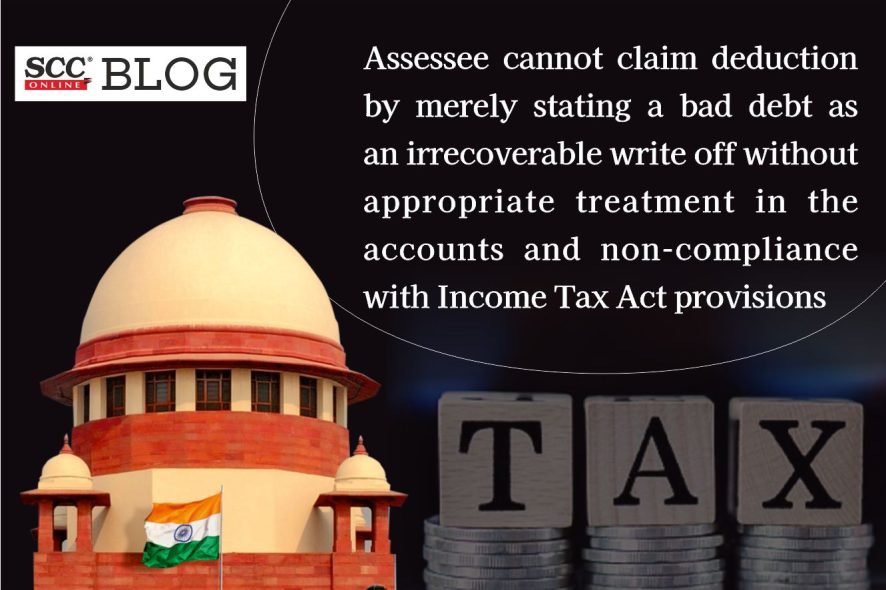Supreme Court: In the case where the Revenue had challenged Bombay High Court’s judgment affirming Income Tax Appellate Tribunal (ITAT)’s order for writing off assessee’s ₹ 10 crores as a bad debt, the 3-judge bench of UU Lalit, S. Ravindra Bhat* and Sudhanshu Dhulia, JJ has summarised the law on writing off a bad debt and has held that merely stating a bad and doubtful debt as an irrecoverable write off without the appropriate treatment in the accounts, as well as non-compliance with the conditions in Section 36(1)(vii), 36(2), and Explanation to Section 36(1)(vii) of the Income Tax Act, 1961 would not entitle the assessee to claim a deduction.
The Court explained that before the amendment in 1989, the law was that even in cases where the assessee had made only a provision in its accounts for bad debts and interest thereon, without the amount actually being debited from the assessee’s Profit and Loss account, the assessee could still claim deduction under Section 36(1)(vii) of the Act. With effect from 1 April 1989, with the insertion of the new Explanation under Section 36(1)(vii), any bad debt written-off as irrecoverable in the account of the assessee would not include any ‘provision’ for bad and doubtful debt made in the accounts of the assessee. In other words, before this date, even a provision could be treated as a write off. However, after this date, the Explanation to Section 36(1)(vii) brought about a change. As a result, a mere provision for bad debt per se was not entitled to deduction under Section 36(1)(vii).
After going through the scheme of the Act and various authorities of the Supreme Court, the Court summarised the following points:
(i) The amount of any bad debt or part thereof has to be written-off as irrecoverable in the accounts of the assessee for the previous year;
(ii) Such bad debt or part of it written-off as irrecoverable in the accounts of the assessee cannot include any provision for bad and doubtful debts made in the accounts of the assessee;
(iii) No deduction is allowable unless the debt or part of it “has been taken into account in computing the income of the assessee of the previous year in which the amount of such debt or part thereof is written off or of an earlier previous year”, or represents money lent in the ordinary course of the business of banking or money-lending which is carried on by the assessee;
(iv) The assessee is obliged to prove to the AO that the case satisfies the ingredients of Section 36(1)(vii) as well as Section 36(2) of the Income Tax Act, 1961.
Coming to the facts of the case, the assessee had contended that an amount of ₹ 10 crores was deposited with one M/s C. Bhansali Developers Pvt. Ltd. towards acquisition of commercial premises in 2007. It was contended that the project did not appear to make any progress, and consequently, the assessee sought return of the amounts from the builder. When the latter did not respond, the assessee resolved to write off the amount as a bad debt in 2009. It was also contended that the amount could also be construed as a loan, since the assessee had ‘financing’ as one of its objects.
The Assessing Officer as well as the Appellate Commissioner of Income Tax [CIT(A)] had disallowed the sum of ₹ 10 crores claimed as a bad debt in determining its income under “Profits and Gains of Business or Profession”. The ITAT, however, allowed the assessee’s plea.
The Court noticed that there was nothing on record to suggest that the requirement of the law that the bad debt was written-off as irrecoverable in the assessee’s accounts for the previous year had been satisfied. Another reason why the amount could not have been written-off, was that the assessee’s claim was that it was given to M/s Bhansali Developers Pvt. Ltd. for acquiring immovable property – it therefore, was in the nature of a capital expenditure. It could not have been treated as a business expenditure.
Hence, it was held that the assessee’s claim for deduction of ₹ 10 crore as a bad and doubtful debt could not have been allowed. The findings of the ITAT and the High Court, to the contrary, are therefore, insubstantial and have to be set aside.
[CIT v. Khyati Realtors Pvt Ltd, 2022 SCC OnLine SC 1082, decided on 25.08.2022]
*Judgment by: Justice S Ravindra Bhat
For Petitioner(s): ASG N. Venkataraman, Advocate H. Raghavendra Rao and AOR Raj Bahadur Yadav
For Respondent(s): AOR Kavita Jha and Advocate Aditeya Bali






